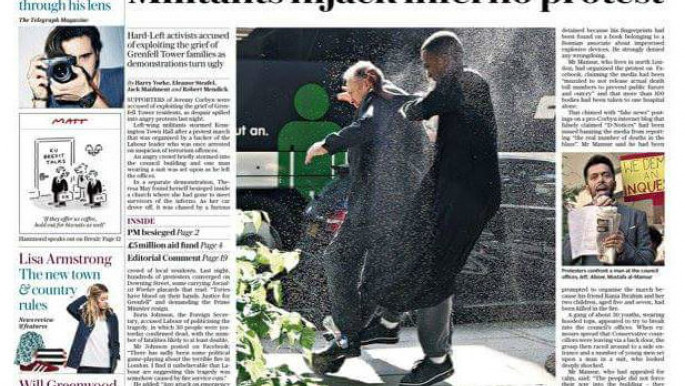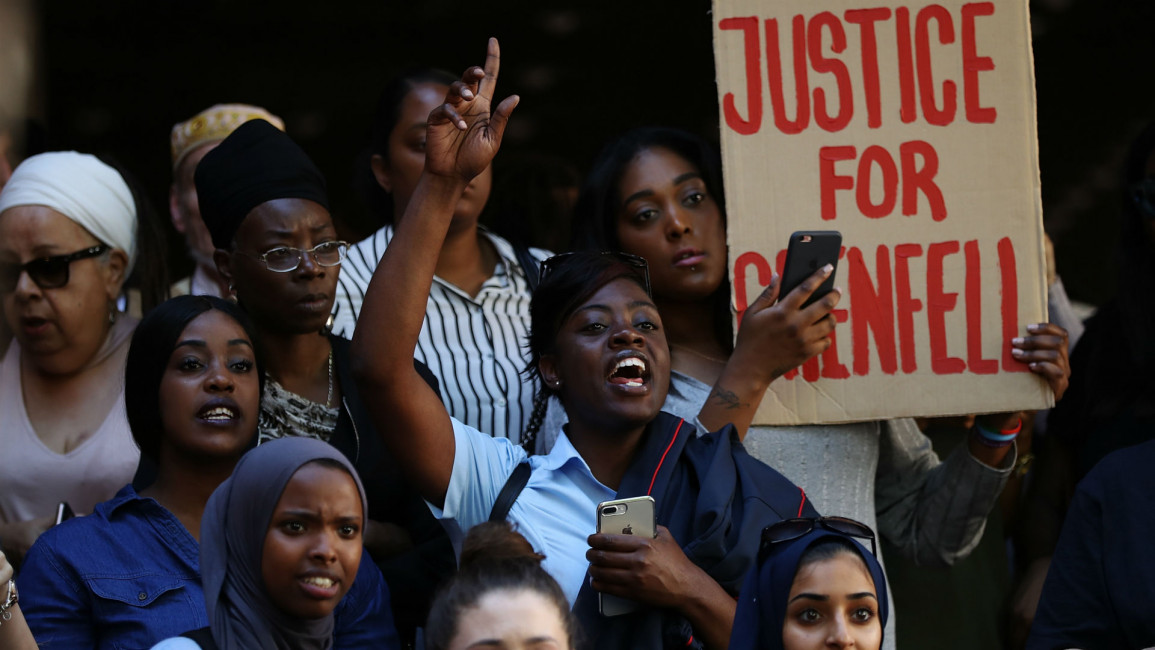
Grenfell Tower fire: London's unity defies the sustained propaganda of the rightwing press
On the ground near the charred ruin of Grenfell Tower, this has been provided by the diverse local community, which has shown admirable strength in gathering together to help and make sense of the mess.
However, the disaster and the lack of clarity from elected officials has directed anger firmly at government, both on a local and national level.
This was seen when distraught local residents stormed Kensington Town Hall to demand answers and jeered Prime Minister Theresa May as she swerved local people once again on Friday.
The community is simply enraged at the lack of answers and the conditions that enabled such a catastrophe.
Yet, sections of Britain's rightwing press are still eager to tell a slightly different story.
"Mustafa Almansur: Who is the leader of the Grenfell Tower protest movement?" a headline from The Telegraph read.
Almansur, we are told, is a "Jeremy Corbyn-supporting political activist who was once arrested on suspicion of terrorism offences".
 |
|
| The Telegraph front page from the day after the Grenfell protests of June 16 [Screenshot] |
For those swayed by the dog-whistle politics of the right in Britain, such a line is indeed triggering.
Labour Party leader Corbyn, the right stressed during the election campaign, is a "terrorist sympathiser".
Mix this in with the fact that a Muslim man - one who has never been convicted or charged with terror offences - is at the forefront of the Grenfell protests, is a useful distraction from justified outrage.
The paper's print edition on the day following the protests ran with the headline "Militants hijack inferno protest," complete with a picture of a Muslim man seemingly involved in a physical altercation with a suit-wearing council official.
For The Telegraph, it is clear that cocktail of the words "militants," "hijack" and the photo of a Muslim man proved too potent a poison to be superseded on the front page by a story about the protesters' grievances. Or Theresa May's failure to meet with local people. Or her former housing minister's postponing of a review into fire safety.
 |
For The Telegraph, it is clear that cocktail of the words "militants," "hijack" and the photo of a Muslim man proved too potent a poison to be superseded on the front page by a story about the protesters' grievances |  |
Indeed, the fallout after Grenfell has provided such a plethora of possibilities for front pages that the choice of the militant spin is quite simply odd.
In the immediate aftermath of tragedy, The Sun and The Daily Mail were also swift to remind us of their thinly-veiled hatred of immigrants to the UK.
Twitter Post
|
Both papers chose to publish photos of the man - a victim himself - who lived in the flat where the fire allegedly started.
"The man 'whose faulty fridge started tower inferno': Neighbour reveals how Ethiopian taxi driver raised the alarm when deadly blaze started in his fourth-floor kitchen," the MailOnline headline read.
If "Ethiopian taxi driver" was not enough to rile the misplaced outrage of its readers, the Mail was sure to include a photograph of the man on holiday and relaxingly sipping a glass of beer.
Given that both the Sun and Mail have for years stirred fear about the UK's minority groups, their lack of sensitivity is not surprising.
Despite their best efforts, however, London's diverse communities have defied their narrative and come together.
 |
| Communities across London came together to help in the humanitarian effort following the Grenfell Tower fire [Getty] |
The fallout after Grenfell has shown that for the press fear mongers, their leaders are disposable, but their bogeymen - Muslims and immigrants - can weather all conditions.
May, who they touted as their upholder of social and economic stability in the weeks running up to Britain's election on June 8, is now embattled.
With approval ratings now lower than her opposition opponent Jeremy Corbyn, the papers that once wagged their fingers at those who opposed austerity the Conservatives' pandering to the hard right on immigration no longer vouch for the "strong and stable" leader.
This is especially the case now, as questions have arisen about the sub-prime materials used in the tower block's refurbishment, as well as about the role of May's new chief of staff in postponing a review into fire safety.
But just as May continues to cling on to power,
sections of Britain's media have held on to belief that they can continue to manufacture false narratives about who our society's villains are.
The masses rejected this narrative at the polls on June 8, and will continue to do so in the quest for justice for Grenfell.




